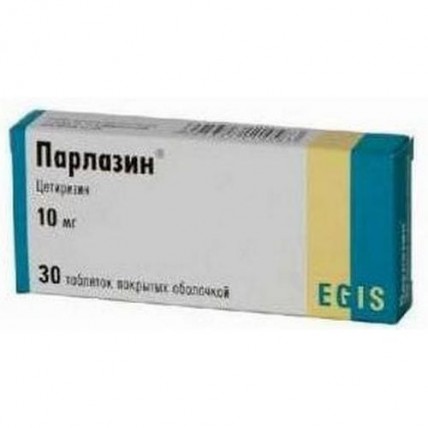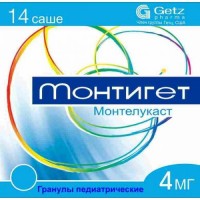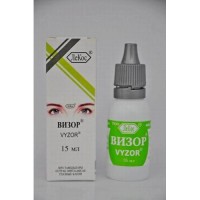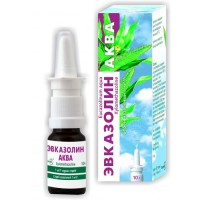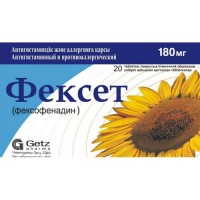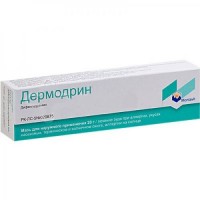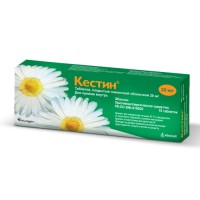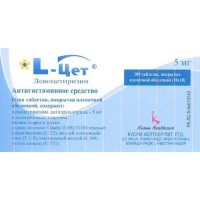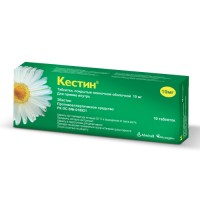Parlazin 30s 10 mg coated tablets
- $22.20
The instruction for medical use of PARLAZIN® medicine the Trade name of Parlazin® the International unlicensed name Tsetirizin Lekarstvennaya the Tablet form, coated 10 mg Structure One tablet contains active agent - a tsetirizin dihydrochloride of 10 mg, excipients: silicon dioxide colloidal anhydrous, magnesium stearate, lactoses monohydrate, cellulose microcrystalline, structure of a cover: yellow Sunset (E110), Opadry Y-1-7000 white (a hydroksipropilmetiltsellyuloza, the titan dioxide (E 171), a macrogoal 400) the Description Light orange, biconvex, oblong, with a tablet facet, coated, with risky on one and an engraving E 511 on other party, flavourless. Pharmacotherapeutic group Antihistaminic drugs of system use. Piperazin derivatives. Tsetirizin. The ATX R06AE07 code the Pharmacological Pharmacokinetics Equilibrium Maximum Concentration properties makes about 300 ng/ml and is reached during 1.0 ± 0.5 hours. Tsetirizin in a dose of 10 mg/day at a repeated dosage within 10 days did not accumulate. Volunteers have pharmacokinetic parameters (Smakh and AUC) and distribution have unimodal character. Food does not influence extent of absorption though the speed of absorption goes down. Degree of bioavailability is similar when using a tsetirizin in the form of solution, capsules or tablets. The seeming volume of distribution is 0.50 l/kg. Linking of a tsetirizin with proteins of blood plasma 93 ± 0.3%. Tsetirizin does not influence linking of warfarin with proteins of plasma. Tsetirizin is not exposed to the significant predistemny metabolism. About 2/3 doses are removed in an invariable form with urine. Elimination half-life makes about 10 hours. Tsetirizin has linear kinetics in the range of doses from 5 to 60 mg. Patients of advanced age At patients of advanced age after single dose in a dose of a tsetirizin of 10 mg time of semi-removal increased approximately by 50%, and the clearance was reduced by 40%, in comparison with persons not of advanced age. Decrease in clearance of a tsetirizin at elderly people it is possibly connected with deterioration in renal function. Patients with a renal failure At patients to a slight renal failure (KK & gt, 40 ml/min.) the pharmacokinetics of drug was similar to pharmacokinetics of healthy volunteers. In a moderate renal failure, in comparison with healthy volunteers, elimination half-life increases by 3 times, and the clearance went down for 70%. In comparison with healthy volunteers, at patients on a hemodialysis (KK ˂ 7 ml/min.) after single dose of a dose of a tsetirizin of 10 mg the elimination half-life raised by 3 times, and the clearance went down for 70%. Tsetirizin badly leaves by means of a hemodialysis. In a moderate-heavy renal failure it is necessary for dose adjustment. Patients with an abnormal liver function At the patients with a chronic abnormal liver function (hepatocellular, cholestatic or biliary cirrhosis) receiving a single dose of 10 mg or 20 mg of a tsetirizin elimination half-life increased by 50%, and the clearance decreased by 40%, in comparison with healthy faces. Change of a dose is necessary only at patients with a simultaneous abnormal liver function and kidneys. The pharmacodynamics Tsetirizin - Hydroxyzinum metabolite, is a selective antagonist of peripheral H1 - histamine receptors. In experiments on linking with receptors in the conditions of in vivo the measured affinity of drug to the receptors different from H1 is not revealed. Except anti-Н1 effect, tsetirizin also has antiallergic activity: in a dose of 10 mg at reception 1 or 2 times a day it inhibits migration of eosinophils in a late phase in skin and a conjunctiva of the persons suffering from an atopy after provocative test by allergen. Researches showed what tsetirizin in a dose of 5 mg and 10 mg strongly inhibits the triple answer (reaction as blossoming) caused by very high concentrations of a histamine in skin, however the correlation with efficiency is not established. Indications - seasonal and year-round allergic rhinitis and conjunctivitis - a chronic idiopathic small tortoiseshell the Route of administration and doses Adult: the recommended dose – on 1 tablets a day, it is preferable for the night. Patients of advanced age: At normal function of kidneys the age is not the reason for reduction of a dose. Patients with a renal failure of moderated – average degree: For patients with a renal failure there are no data on efficiency/safety of drug. As, tsetirizin it is generally removed by kidneys, in cases when other types of treatment are impossible, the dosage of drug should be selected individually, taking into account function of kidneys. For use of this table it is necessary to estimate clearance of creatinine at the patient (Clcr) at ml/min. After determination of level of creatinine of blood serum (mg/dl) the Clcr value (ml/min.) can be estimated on the following formula: For men: MM) for women: the received value´ 0.85 Dose adjustment at patients with diseases of kidneys: The Dose Clearance of Creatinine group and frequency of reception Normal function of kidneys of ≥80 10 mg once a day the Moderated renal failure of 50-79 10 mg once a day the Renal failure of average degree of 30-49 5 mg once a day the Heavy renal failure of ˂30 5 mg of 1 times in 2 days the Renal failure, dialysis ≤10 Contraindicated Patients with abnormal liver functions to the Patients having abnormal liver functions are not present need for dose adjustment. Patients with abnormal liver functions and kidneys dose adjustment Is recommended Duration of treatment is defined by the doctor individually depending on a clinical condition of the patient. Use in pediatrics For treatment of children aged from 6 months up to 6 years is recommended Parlazin in the form of solution for intake. Side effects Often (≥1/100 - & lt, 1/10) - sedation dependent on a dose - feeling of fatigue - a headache, dizziness Infrequently (≥1/1.000 - & lt, 1/100) - excitement - paresthesia - an abdominal pain, dryness in a mouth, nausea, diarrhea - an itching, rash - an asthenia, feeling sick Is rare (≥1/10.000 - & lt, 1/1.000) - hypersensitivity - aggression, confusion of consciousness, a depression, hallucinations, insomnia - spasms, disturbances of movements - tachycardia - changes of function of a liver (increase in level of transaminases, alkaline phosphatase, γ-GT and bilirubin) - a small tortoiseshell - hypostases - increase in body weight is Very rare (& lt, 1/10000) - thrombocytopenia - an acute anaphylaxis - a tic - disturbance of taste, a syncope, the tremor, dystonia, dyskinesia - a Quincke's disease, the fixed toxidermia (the reaction arising on the same place) - disturbance of visual accommodation, illegibility of sight, an okulogirny syndrome - a dysuria, Contraindication enuresis - hypersensitivity to a tsetirizin or other components of drug - a heavy renal failure (clearance of creatinine ˂ 10 ml/min.) - rare inherited disorders of tolerance to a galactose, hereditary deficiency of lactase the Sami or a glucose galactose not absorption syndrome - children's and teenage age up to 18 years - pregnancy and the period of a lactation Medicinal interactions On the basis of pharmacokinetics, a pharmacodynamics and a profile of tolerance of drug, are not expected interactions of drug with other medicines. In researches on interaction neither the pharmakodinamichesky, nor significant pharmacokinetic interactions, in particular with pseudoephedrine and theophylline (400 mg/day) were observed. Meal does not reduce absorption of a tsetirizin though the speed of absorption goes down. In therapeutic doses the clinically apparent interaction of Parlazin with alcohol (was not observed at the blood alcohol level of 0.5 g/l). Nevertheless, it is necessary to be careful at combined use of Parlazin with alcohol. The special instructions Treatment Parlazinom should be stopped in 3 days prior to carrying out Prik-testa – (alergotest a skin scratch) for the purpose of prevention of distortion of reaction. Parlazin it is necessary to apply with care at patients with epilepsy and persons with risk of developing spasms. Tablets, coated, contain lactose. Patients, with a lactose intolerance, about it are in due time warned. Features of influence of medicine on ability to run the vehicle or potentially dangerous mechanisms. At the first reception of Parlazin it is necessary to pay attention to a possibility of development of side effects (drowsiness). Patients are recommended to abstain from driving of the car or control of mechanical devices before disappearance of side effects. Further in need of driving of motor transport or during the work requiring special attention, patients should not exceed a daily dose of 10 mg. Overdose Symptoms: the side reactions registered after reception of a dose of Parlazin by 5 times exceeding the recommended daily dose - confusion of consciousness, diarrhea, dizziness, fatigue, feeling sick, a mydriasis, an itching, concern, a sedation. Drowsiness, stupor, tachycardia, tremor, ischuria. Treatment: it is necessary to cause vomiting and also to appoint the symptomatic and supporting treatment. Specific antidote does not exist. For removal of drug from blood the hemodialysis is not effective. The form of release and packing On 10 tablets place in blister strip packaging from aluminum PVC/PVDH/foil. On the 1 or 3 blister strip packaging together with the instruction for medical use in the state and Russian languages in a pack from cardboard. To Store storage conditions at a temperature not over 25 of 0C. To store in the inaccessible place for children! 4 years not to use a period of storage after an expiration date. Prescription status According to the prescription BUDAPEST CJSC EGIS PHARMACEUTICAL PLANT Producer 1106, Keresturi St., 30-38 Hungary Phone number: (36-1) 803-5555, the fax: (36-1) 803-5529 Owner of the registration certificate of CJSC Pharmaceutical Plant Egis, Hungary the Address of the organization accepting in the territory of the Republic of Kazakhstan claims from consumers on quality of products (goods) Representation in RK CJSC EGIS Pharmaceutical Plant 050060, Almaty, Zharokov St. of 286 G ph. + 7 (727) 247 63 34, + 7 (727) 247 63 33, fax: + 7 (727) 247 61 41, e-mail:
To Develop egis@egis.kz
To Develop egis@egis.kz
